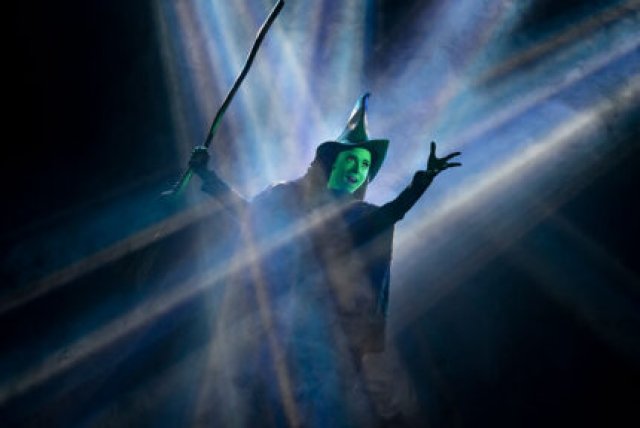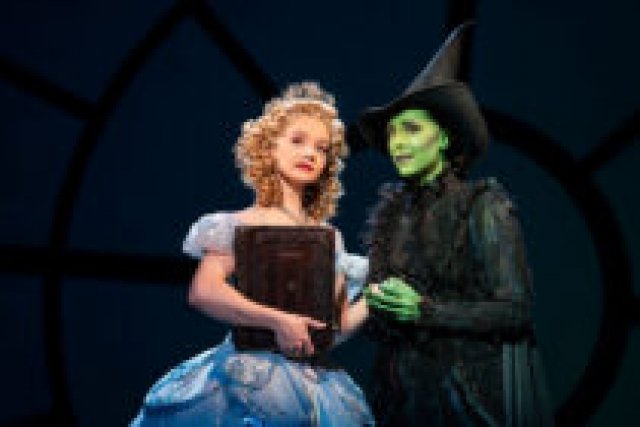Wicked in South Florida
A National Equity Touring Production
By: Aaron Krause - Feb 21, 2023
Clearly defining the megahit musical Wicked can prove almost as daunting as defying gravity.
Indeed, it is part origin story, part musical, part fantasy, part prequel, part fable, part love story, and part cautionary tale.
Undoubtedly, Wicked boasts a winning combination. Toss in generous helpings of magic, spectacle, and theatricality, throw in a pinch of humanity, add doses of relatability, timeliness, and timelessness, include humor and drama, as well as memorable folk/pop influenced music. Mix everything well, and the resulting combination will cast many a spell.
No wonder Wicked has captured hearts worldwide and repeatedly returns to venues to captivate. For instance, for the fourth time since 2007, a production is playing in Miami. The venue is the Adrienne Arsht Center for the Performing Arts of Miami-Dade County.
The current believable and energetic equity national touring production runs through March 5 at the Arsht in downtown Miami.
While Wicked is many things, it is not a mishmash. Rather, it is a layered show that will always be timely since it covers universal themes. They include prejudice, acceptance, corruption, power, as well as the nature of good and evil. As a classic, people are likely to uncover new meanings with each viewing.
After witnessing Wicked, we may wonder whether people are born evil or develop such characteristics. Also, who has the right to brand us as “Wicked?” While the show does not offer easy answers, it leaves us with plenty to think about.
For those unfamiliar with Wicked, its basis is Gregory Maguire’s 1995 novel, Wicked: The Life and Times of the Wicked Witch of the West. Meanwhile, the novel’s basis is the classic 1939 movie, The Wizard of Oz. And that beloved film’s source material is L. Frank Baum’s 1900 children’s novel, The Wonderful Wizard of Oz. Winnie Holzman penned Wicked’s compelling book, while Stephen Schwartz wrote the lyrics and composed the score.
Wicked takes place in the land of Oz before a tornado landed Dorothy there and while she is there. The tale explains how the Wicked Witch of the West became who she is and how Glinda became the Good Witch of the North.
When Wicked begins, Elphaba is a young woman born with green skin. She is serious, passionate, fiery, smart, misunderstood, and an outcast. In addition, she possesses magical powers. With all of her traits, Elphaba may remind you of the titular character in Roald Dahl’s classic tale, Matilda.
Contrastingly, Galinda (later Glinda) is a popular and bubbly blonde young woman. She may remind you of Elle Woods in Legally Blonde, except Glinda is more complex.
When the powers that be at the fictional Shiz University pair up Elphaba and Glinda as roommates, the two start off as hated rivals. However, as time passes, they become unlikely friends. But eventually, for reasons you will learn, others brand Elphaba as “Wicked,” and Glinda as “Good,” placing them into opposite camps.
After experiencing Wicked, you will likely never view The Wizard of Oz the same way again. For example, suddenly you may sympathize with The Wicked Witch of the West/Elphaba. And you may think less of The Wizard and Glinda.
Wicked creates credible backstories for The Wizard of Oz’s characters. In addition, the show includes humorous references to its source material that will leave you nodding and laughing.
While Wicked delights and causes laughter, it also warns. Without question, the show reflects the divisive times during which we live. Amid concerns of an eroding democracy and the rise of activity such as censorship, it can be chilling to watch as an oppressive government arises in Oz. Indeed, the silencing and arresting of Oz’s talking animals symbolizes something larger and concerning.
In the musical, the head of the aforementioned government is none other than The Wonderful Wizard of Oz.
He is more concerned about his popularity than his morality. Metaphorically, he stands for the corruption of power through false representation. The Wizard is a familiar kind of figure today, with U.S. Rep. George Santos making headlines regarding alleged lies he made about himself.
In the equity national touring production playing in Miami, Timothy Shew believably portrays the character with a soft-spoken informality that befits him. Shew’s Wizard is a seemingly well-meaning, plain man who is hiding something.
One character in Wicked who does not appear in The Wizard of Oz is Madame Morrible. She is the headmistress of Crage Hall at Shiz University and a cohort of The Wizard.
As Morrible, Natalie Venetia Belcon commands the stage. Specifically, the performer imbues Morrible with a confidence that at first wins you over. However, eventually you realize that this shrewd person is up to no good.
Speaking of goodness, Jennafer Newberry shines as Glinda, imbuing her with bubbly charm, warmth, and passion. With her bright, cheery smile, Newberry’s Glinda can light up a room just by descending into it as she does in her bubble. This performer possesses a clear and powerful voice that is also tender and sincere in songs such as “For Good.”
Glinda sings “For Good” with Elphaba toward the end. During the song, both realize how strongly they have affected each other. The song has become popular outside of Wicked.
Opposite Newberry, Lissa deGuzman powerfully portrays Elphaba.
This is a challenging role that requires an actor with a strong, clear and versatile voice. deGuzman demonstrates her powerful pipes during the song, “Defying Gravity.” During the song, Elphaba literally defies gravity, ascending skyward and asserting with Mama Rose-like force and vehemence that nobody will stop her.
In a multi-faceted performance, deGuzman convincingly injects Elphaba with qualities such as passion, concern, frustration, sincerity, humility, and tenderness. In addition, the performer demonstrates deft vocal control, clarity, and strength.
Other cast standouts include Christian Thompson. He embodies Fiyero with a carefree, likable personality that makes it easy to understand why people as different as Elphaba and Glinda fall in love with him.
Also, among the supporting cast, Tara Kostmayer embodies a sensitive Nessarose, Kyle McArthur brings Boq to life with humor and passion, while Boise Holmes lends Dr. Dillamond a nobleness and warmth.
Behind the scenes, Eugene Lee’s intricate and spacious set deftly differentiates between realism and non-realism. Meanwhile, Kenneth Posner’s varied lighting highlights characters, and creates tension as well as emphasis. The lighting, combined with plenty of stage fog, helps to create a world full of tension and mystery.
Tony Meola’s clear sound design allows us to hear just about every word, while Susan Hilferty’s costumes help to define character. Also, the special effects by Chic Silber look impressively real. And a vibrant, live orchestra accompanies the actors without drowning them out.
Wicked is not perfect. For instance, it can be preachy at times, and the ending is confusing. However, overall, this show offers theatergoers a breathtaking visual feast, a mental workout, and an emotionally fulfilling theatrical experience.
By the way, if you are not able to see it in Miami, the production will play the Kravis Center in West Palm Beach from March 29 to April 9.
Wicked runs through March 5 at the Ziff Ballet Opera House at the Adrienne Arsht Center for the Performing Arts. The address is 1300 Biscayne Blvd. in downtown Miami. Tickets range from $33-$193. Call (305) 949-6722 or go to arshtcenter.org for information.
The production will also run from March 29 through April 9 at the Kravis Center for the Performing Arts, 701 Okeechobee Blvd. in West Palm Beach. Ticket prices range from $63-$223. Call (561) 832-7469 or go to Kravis.org for more information.


